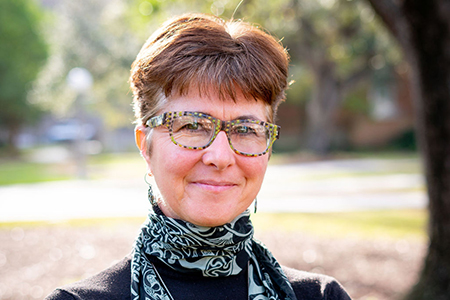 "I didn't want to study about the 13 British Colonies. New Orleans had a French and Spanish colonial background so I thought I could study technically what would fall under 'American history,' but it would be very different. I hadn't been to New Orleans and I wanted to check it out. So I was taking a cab ride from the airport and the cab driver was talking to me as they do in this city. And he had this New York accent so finally I asked him when he moved here. He said to me, 'Moved here? I've never left here!' And I'm going, 'Wait a moment. What do you mean?' And he says, 'I'm from the Channel,' and I'm like, '... what's the channel?' and he's like, 'The Irish Channel.' And at this point, he was thinking I'm a complete idiot because I was like, 'The Irish Channel? The what?' So he told me a bit about the Irish Channel and I thought, 'My goodness. There was an Irish population here? Well, maybe it's just the name of the neighborhood. Maybe that's all that it is. Let me look into this little bit further.' And so I did.
"I didn't want to study about the 13 British Colonies. New Orleans had a French and Spanish colonial background so I thought I could study technically what would fall under 'American history,' but it would be very different. I hadn't been to New Orleans and I wanted to check it out. So I was taking a cab ride from the airport and the cab driver was talking to me as they do in this city. And he had this New York accent so finally I asked him when he moved here. He said to me, 'Moved here? I've never left here!' And I'm going, 'Wait a moment. What do you mean?' And he says, 'I'm from the Channel,' and I'm like, '... what's the channel?' and he's like, 'The Irish Channel.' And at this point, he was thinking I'm a complete idiot because I was like, 'The Irish Channel? The what?' So he told me a bit about the Irish Channel and I thought, 'My goodness. There was an Irish population here? Well, maybe it's just the name of the neighborhood. Maybe that's all that it is. Let me look into this little bit further.' And so I did.
I found out that there was this Irish population that added to that cultural gumbo mix of New Orleans, but nobody had done any work on it. There was only one dissertation and a few theses a very long time ago; 50, 60, or 70 years ago. So I thought, 'Wow. Okay. Here it is.' I wish I had gotten his name because I would've liked to give him a little dedication in the book and say, 'Hey, you're the one who put me on this path.' My research is on Irish immigrants in New Orleans in particular. I have a book, The Irish in New Orleans. I teach a course on the Irish in New Orleans and I am the program director for Tulane's Summer in Dublin program. The beauty of immigrant history is that you have your foot in two different countries. You can't teach about immigrants without studying where they came from. What are the push and pull factors? Why did they leave that country? Where did they go? Why did they come here? So what was the push out of Ireland, what was the pull to New Orleans?"
